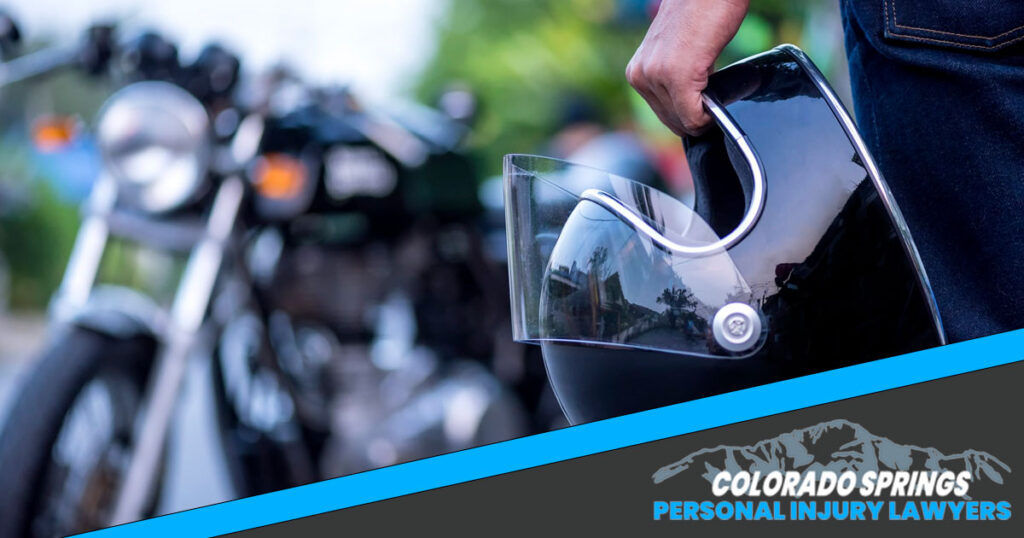Updated January 16, 2025 by Jonathon Douglas
Colorado has some of the country’s most scenic and thrilling roadways to enjoy on a motorcycle. Feeling the wind on your face while navigating the open road on two wheels offers an exhilarating experience and an incredible sense of freedom unique to riding motorcycles. In Colorado, this freedom also includes the choice of whether or not to wear a helmet. If the rider and passenger are 18yrs or older they are not legally required to wear one, however, accidents involving motorcycles can have tremendous consequences and wearing a helmet is highly recommended.
Protective eyewear however, is legally required by Colorado law to be worn by all motorcycle operators and riders regardless of age. Failure to wear protective eyewear can be considered negligence and a percentage of fault if the operator involved contributed to an accident from having their vision obstructed by debris or weather conditions, whereas the lack of helmet use would not be considered negligence regarding the prevention of accident, injury or severity of injury to the operator.
Regardless, insurers will still try to argue that wearing a helmet would have prevented or lessened the severity of an injury, and not wearing one possibly created the conditions that lead to an accident such as the operator being struck in the head by road debris. An experienced Colorado Springs motorcycle accident lawyer can help you understand your rights, if choosing to not wear a helmet will affect your motorcycle injury claim and deal with insurers trying to force an inadequate settlement.
Colorado Motorcycle Helmet Laws
Motorcycle riders 18 yrs and over in Colorado have not been legally required to wear helmets since 1977. A DOT approved helmet must be worn by all motorcycle operators and passengers under 18 yrs of age, as per Colorado Revised Statute § 42-4-1502, and if the helmet does not include eye protection, goggles or eyeglasses made of safety glass or plastic are required by law, § 42-4-232, to be worn.
Will Not Wearing a Helmet be Considered Negligence and Affect My Motorcycle Accident Injury Claim?
Establishing negligence is the primary element for any accident claim, whether it is related to a vehicle or a motorcycle. Accidents involving motorcyclists present challenges specific to riders, making their claims more complicated. Because of a perceived assumption of risk involved with motorcycles, riders face more scrutiny from adjusters. Insurance companies will try to assign as much liability to the motorcycle rider as possible to reduce the amount they pay out or to avoid paying a claim altogether. Colorado’s modified comparative negligence law says an injured person is ineligible to claim damages if they are at least 50% at fault for the accident. They must be found 49% or less at fault to receive damages and their percentage of fault contributed will reduce the amount of damages accordingly.
However, since there isn’t a mandatory law for adult riders to wear a helmet, not wearing one cannot be considered an act of negligence. This means that a claim for damages cannot be devalued and compensation reduced because the person chose not to wear a helmet.
An example of this, tried by the Colorado Supreme Court, is in the case of Dare v. Sobule involving a wrongful death that occurred due to a motorcycle accident. The court ruled that, under Colorado’s law of comparative negligence, the choice to not wear a helmet is inadmissible to show negligence on the part of the operator or to mitigate damages, and should not decrease the amount of the claim for compensation. Also, it is not the responsibility of the operator to anticipate that another driver is going to behave negligently or cause an accident.
Motorcycle Accident Injuries Related to Not Wearing a Helmet
Accidents involving motorcycle riders not wearing helmets are often very severe; the negligent actions of another driver can result in the following injuries, some of which can have a lifelong impact on the rider:
-
- Head injuries – ranging from mild to severe depending whether or not the rider was wearing a helmet.
- Traumatic brain injuries (TBI) – Usually resulting from not wearing a helmet, or head-on collision
- Neck injuries – This can include whiplash, fractured vertebrae, and herniated disks.
- Broken or fractured bones – Face and skull
<li”>Severe skin abrasions – Commonly referred to as road rash or road burn, caused by the skin being worn off due to friction from the road while sliding at a high rate of speed.
Despite a rider’s best vigilance efforts, they cannot always avoid an accident or the actions of a negligent driver. In the unfortunate event of a motorcycle accident that causes bodily injury, hiring an experienced Colorado Springs personal injury attorney will be beneficial. They can successfully maneuver through your claim’s legal obstacles to obtain a settlement to cover your losses and support your recovery without financial worry.
How Not Wearing a Helmet Can Affect Accidents
Not wearing a helmet while riding a motorcycle can possibly contribute to an accident. Wearing a helmet can prevent a rider from being struck in the head by an object kicked-up by the wheels of another vehicle. This also includes protection from a face shield on the helmet from getting hit in the face or eyes by debris, rocks, litter, bugs or whatever else could go flying through the air while traveling at speed on a motorcycle down the road. Wearing a helmet can also protect the rider from adverse weather conditions like rain, hail or snow that can distract a rider and impede their vision.
Precautions You Can Take to Protect Yourself From a Motorcycle Accident
Unlike cars and other vehicles with airbags, seat belts, and a structure to protect the driver, motorcycles are open to the elements leaving the rider exposed and extremely vulnerable to severe or fatal injuries from an accident. In 2022, motorcyclists accounted for 20% of Colorado’s total traffic fatalities; of the 149 riders that lost their lives in crashes, 75 were not wearing helmets. This statistic is why it’s imperative motorcyclists must take their protective measures for safety seriously, unfortunately motorcycle cycle traffic fatalities increased in 2023. Between January 1st to December 1st, 2023 the Colorado Department of Transportation reported 162 motorcycle fatalities. Not wearing a helmet, speed and intoxication were the leading factors.
There are safety precautions you can take for your protection, to significantly reduce the odds of having an accident, and lower the risk of severe injury.
Wear Protective Gear
In Colorado, anyone under 18 yrs of age must wear a helmet if they are on a motorcycle. Eye protection however is legally required, regardless of age, to operate or ride on a motorcycle. Although not required over 18yrs, wearing a DOT-compliant helmet at any age will greatly reduce the risk of sustaining a serious or fatal head injury, and investing in quality protective gear is highly recommended. Jackets, pants, boots, gloves, and reflective or bright clothing specifically designed for riding motorcycles will help increase your safety on the road.
Be Vigilant
Always be aware of your surroundings and focused while riding. Scan the road ahead for changing conditions or hazards, be extra vigilant in high traffic areas, at night, and on the highway. Never put yourself or others at risk by riding while intoxicated, and avoid riding if you are too tired.
Take a Refresher Course
Improving your motorcycle riding techniques, regardless of how much experience you have, is alway beneficial. The riding time in Colorado is limited by the winter season, after a few months off your bike a motorcycle safety course can refresh your skills and confidence out on the road.
Obey Traffic Laws
Always follow the traffic laws and obey the speed limits where you ride. Avoid changing lanes recklessly through traffic and use your turn signals.
Be Seen and Heard
Lights aren’t just for nights, keeping them on during the day can help make you more visible to drivers. Use your horn to alert other vehicles or pedestrians of your presence if they’re not paying attention, and avoid riding in blind spots to make sure drivers can see you.
Maintain Your Motorcycle
Before you ride, always check your lights, be certain your brakes are functioning properly, and make sure that your tires are in good condition with the correct air pressure.
Be Properly Insured
All Motorcyclists and drivers in Colorado must have minimum liability insurance. Although not required, it’s recommended that riders carry optional insurance coverage as well. Optional additional policies, such as enhanced personal injury coverage and uninsured motorist coverage can provide the rider further protection financially.
Contact a Colorado Springs Motorcycle Accident Lawyer
After being injured in a motorcycle accident, protect yourself and get the compensation you deserve by consulting our highly experienced and award-winning attorneys. They will navigate the complex process presented to motorcyclists from difficult and impatient insurance companies by dealing with any resistance that might prevent a fair value for your settlement.
We prioritize our clients, listen to their needs, and provide custom-tailored attention until we get a desirable outcome. Your injuries caused by another’s negligence can require temporary or long-term care. We will provide you with the strongest legal representation possible to minimize stress and ensure you are financially secure for your recovery including the care you may need in the future. Contact us today for a free consultation.
Protecting The Rights Of Colorado Springs Personal Injury Victims
Our goal is to help victims who have been seriously injured in an accident. At Colorado Springs Personal Injury Lawyers, we work aggressively to help. We have substantial experience representing injured clients and dealing with insurance companies. Our skills allow us to work strategically and maximize your financial recovery.
For more information please contact us at Colorado Springs Personal Injury Lawyers® to schedule a free consultation with an attorney today.
Colorado Springs Personal Injury Lawyers
102 S Tejon St Suite 1100
Colorado Springs, CO 80903
(719) 888-4878

















